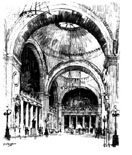
When Was Sunday Mass Obligation Changed to an Option?
EMPTY PEWS, EMPTY SOULS
Over the past four decades, weekly Mass attendance by Catholics in the U.S. has dropped from 70 percent to 25 percent. This raises a poignant question: What has transpired that has led to this mass exit from the pews? Did the Holy See issue a proclamation eliminating the Sunday Obligation? No! On the contrary, Canon 1247 of the 1983 Code of Canon Law says, “on Sundays and other holy days of obligation, the faithful are bound to participate in the Mass.” And the Catechism of the Catholic Church says, in support of this law, that the “first precept” of the Church “requires the faithful to participate in the Eucharistic Celebration when the Christian community gathers together on the day commemorating the Resurrection of the Lord” (no. 2042).
It is important that we not overlook that word “first.” The Church does not say that attending Mass is one of the many precepts of our faith, but that it is the first, the basic precept — a precept that forms the foundation upon which all else is based. It would be disastrous for the Church and for individual Catholics if attending weekly Mass were not at the heart of the practice of the Catholic faith, for it is impossible for Catholics to grow in their faith — or even sustain their faith for long — when they choose not to draw sustenance from the Word and the Blessed Sacrament.
Over the course of history, the Church has always looked back and reflected on the significant events of previous centuries. So, clearly, one of the principal things we want our great-great-grandchildren to be able to say in A.D. 2100 is: “The 21st century saw a remarkable revitalizing of the Church.” This must not be simply our hope or even our fervent prayer, it must be our firm resolve. However, before we can accomplish this objective, we must first understand the various factors that have caused the spiritual peril evidenced by the sharp drop in Mass attendance.
The first factor is that we have forgotten our Catholic history. Fr. Ray Rayland addressed this issue in the July/August 2000 issue of This Rock. He referred to the research conducted by historian Gregory Dix, who determined that the Roman government (in the first century) paid little attention to individual Christian believers. Their well-orchestrated attacks were limited to the Christians who participated in corporate worship. Once a Christian stopped attending services (under the threat of death) the Romans didn’t care whether he was sincere or not, as long as he didn’t worship publicly, for they knew that the assembly would exclude non-worshipers from its ranks very quickly. Therefore, it was always the assembly that was the target — never the individual. It is significant that the Church and the state agreed on this one point, namely, that the litmus test for determining whether a person were a Christian was whether he shared regularly in the Church’s worship. As far as the state was concerned, the person who professed Christian beliefs, but did not express them in worship, was no danger. As for the Church, beliefs not expressed in regular Eucharistic worship were seen as meaningless.
You May Also Enjoy
The Archbishop of Detroit will ordain only two men next year. Quelle surprise!
In Lawsuits He Trusts... We're Taking Our Ball & Going Home... American Catholics: Unclear on the Concepts...
Our morally bankrupt political leaders lie for a living and call it the “fact-checked” truth.

